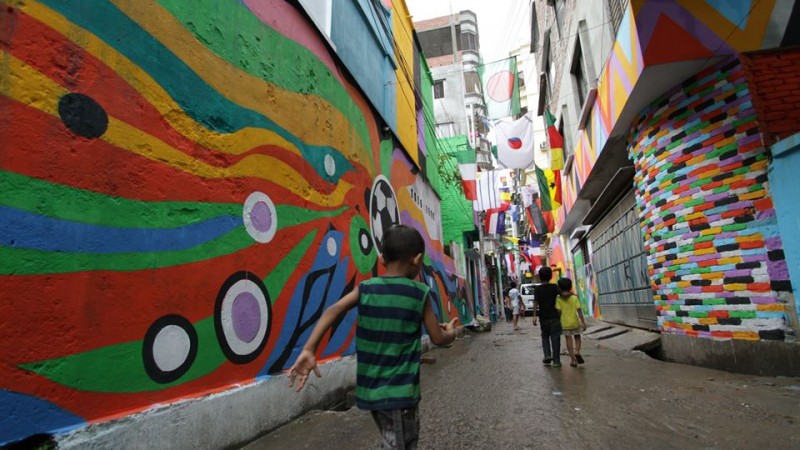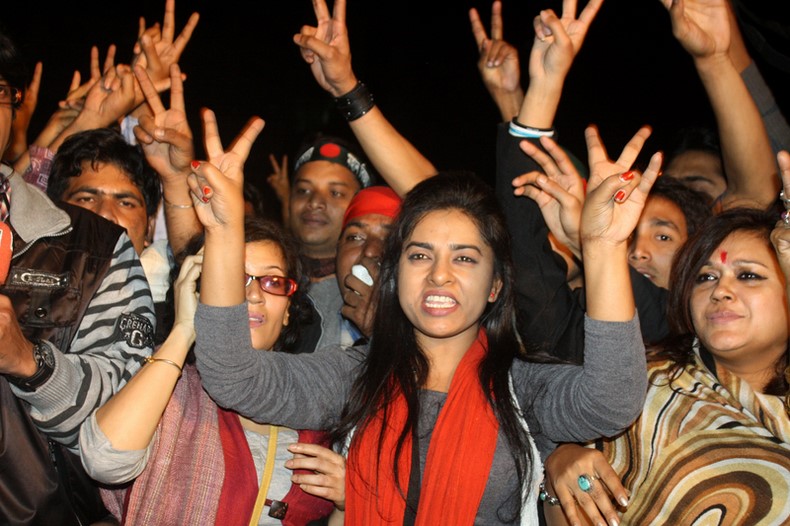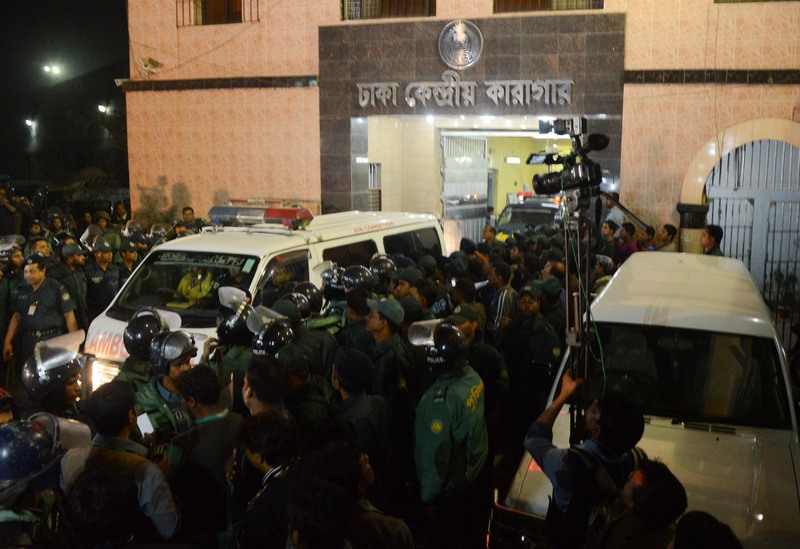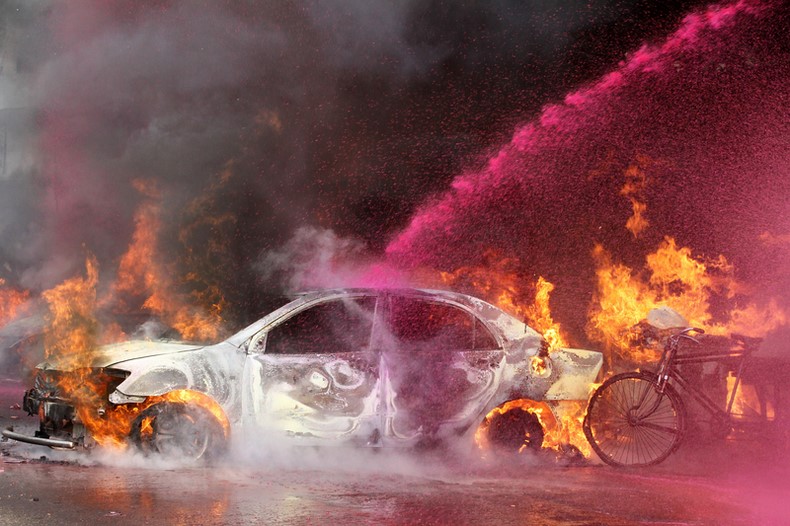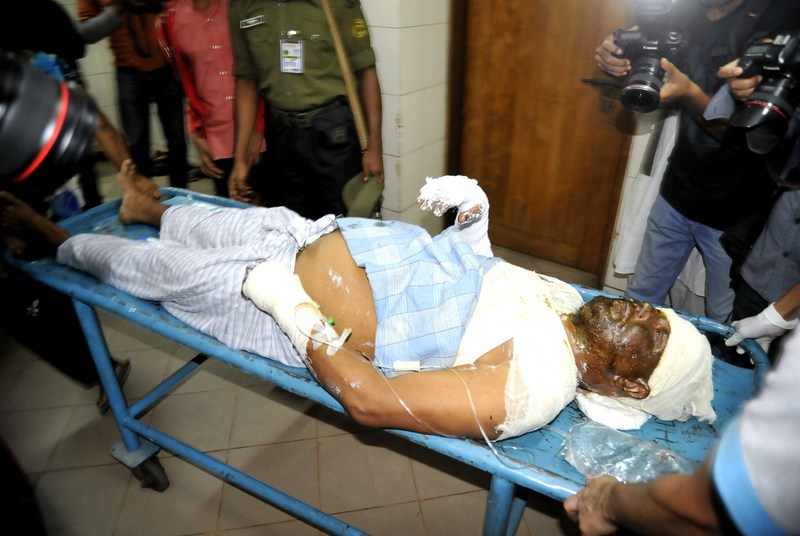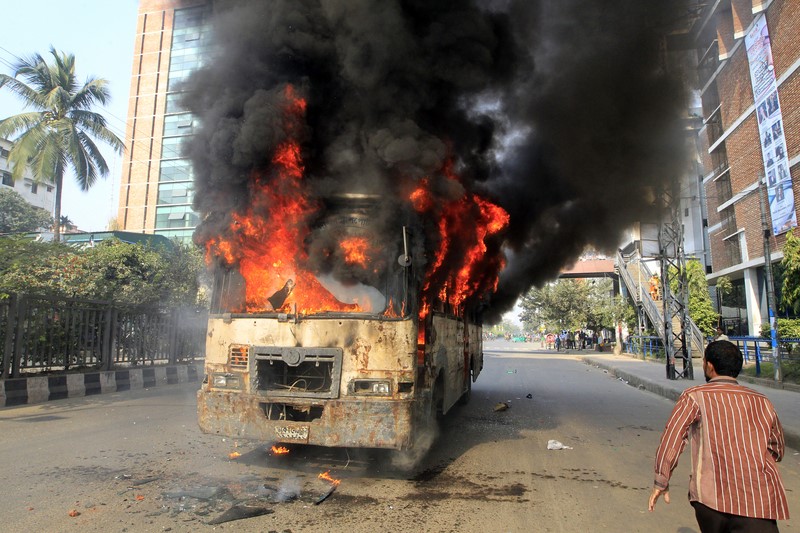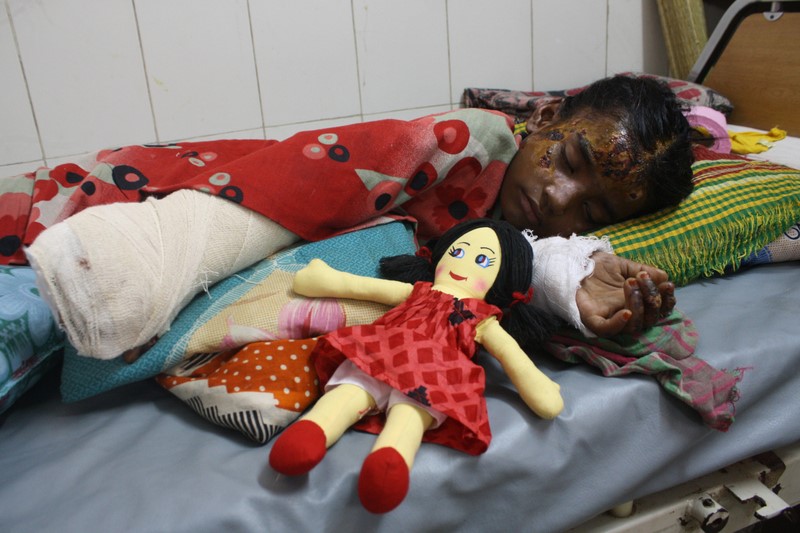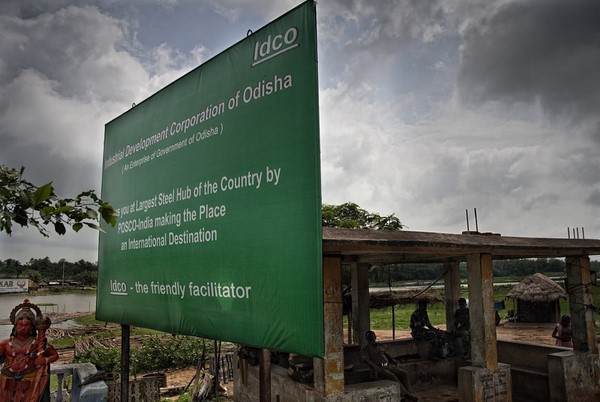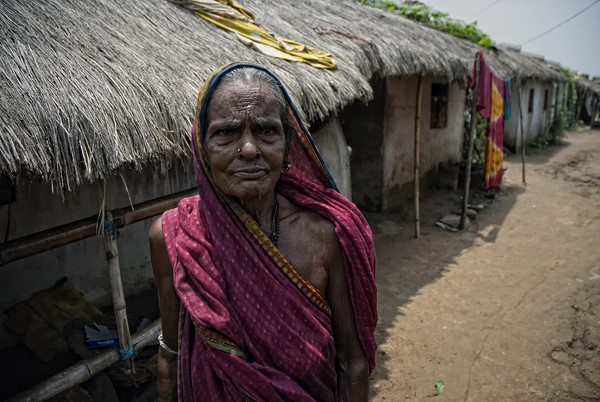Dragonfly
Image by Rezwan
The World Cup Goal-E Project
This street in Bangladesh has a colorful world cup celebration
New Chum Hill Ruins
Remnants of Kiandra gold mine at New Chum Hill, #nsw #australia
December 20, 2013
December 15, 2013
The Startup Scene In Dhaka
Sunday, December 15, 2013
No comments
This is a story about Startup community in Dhaka that uses the power of Internet to create new and exciting businesses.
The film shows some of the people who are working as startup founders, investors and mentors in Dhaka. It asks them about their experiences, listen to what they think the future holds for this brewing Startup community.
Learn more about Startup Dhaka.
The film was made by raising fund ($9002) at the Indiegogo platform. It shows if you are willing funding is never a problem. Your action is needed.
“Build and they will come.”This is the requirement of any startup.
“When you meet any person just say ‘Hi’, ‘Hello’ and ‘Nice to meet you’ because network matters’-Fayaz Taher, CEO Fortuna Group.And another powerful tool is building networks. There are a lot of Non-Resident-Bangladeshis coming back to their homeland to invest in startup opportunities. All the budding entrepreneurs need is to connect and network with them to find a synergy. Here is an effort to map all the startups in Dhaka. Why not add your one here!
December 14, 2013
Bangladesh Executes Islamist Leader Abdul Quader Mollah for War Crimes
Saturday, December 14, 2013
No comments
Abdul Quader Mollah, the assistant secretary general of right-wing Islamist party Bangladesh Jamaat-e-Islami convicted of crimes against humanity during Bangladesh's bloody liberation war from Pakistan in 1971, was executed inside the capital city Dhaka's Central Jail late 12 December 2013.
The hanging sparked a wave of deadly violence from supporters, leaving several dead and a number of homes and businesses torched.
Quadar Mollah was the first to die for war crimes committed during the struggle for independence, in which an estimated 300,000 and three million people were killed and 200,000 women were raped. Jamaat-e-Islami joined forces with Pakistan's secret service to form militia groups such as Razakars & Al-Badr ("the moon") to fight against the nationalist movement and freedom fighters. These forces aided Pakistani forces in the killings.
As a member of Jamaat's student wing Islami Chatra Sangha, Quader Molla joined Al-Badr and, according to charges framed against him, led a mass killing in Mirpur, thus earning the name Butcher of Mirpur among locals. He was also responsible for the shooting of 344 people, the rape of an 11-year-old girl, and the beheading of a poet.
After the formation of Bangladesh's International Crimes Tribunal in 2009 to prosecute those who participated in the war's genocide, he was arrested 13 July 2010, and more than a year later on 18 December 2011, he was formally charged with six charges and 344 counts of murder. On 5 February 2013, he was given a life sentence, with an additional 15-year sentence, for his crimes.
But the verdict sparked massive protests demanding his death as well as an end to extremism in politics. Thousands of people joined the demonstrations in Dhaka's central square, which became known as the #2013 Shahbag protests (see Global Voices special coverage page).
The government appealed against Quader Mollah's first verdict, and on 17 September 2013, the Bangladesh Supreme Court found him guilty of murders and other war crimes and converted his life sentence to a death sentence.
So far, 12 people excluding Quader Mollah have been arrested and the trials are ongoing in different stages. A number of them have already been awarded with sentences ranging from life imprisonment to death. Members of political party Jamaat have led protests against the trials, alleging that the government is trying to suppress the opposition through the trials.
There have been intense Twitter campaigns from #Shahbag activists (using hashtags like #shahbag & #BanJamaat) in favor of the execution and Jamaat supporters (using hashtags like #FreeQuaderMollah, #WeAreQuaderMollah, #MartyrAbdulQuaderMollah), with some of the hashtags trending on given days. Activist Allan Turing (@turing1010) thanked the #Shahbag movement and tweeted:
Ishtiaq Al Mahmud (@iamahmud) provided an update on the Jamaat violence after the execution of Quader Mollah:
The hanging sparked a wave of deadly violence from supporters, leaving several dead and a number of homes and businesses torched.
Quadar Mollah was the first to die for war crimes committed during the struggle for independence, in which an estimated 300,000 and three million people were killed and 200,000 women were raped. Jamaat-e-Islami joined forces with Pakistan's secret service to form militia groups such as Razakars & Al-Badr ("the moon") to fight against the nationalist movement and freedom fighters. These forces aided Pakistani forces in the killings.
As a member of Jamaat's student wing Islami Chatra Sangha, Quader Molla joined Al-Badr and, according to charges framed against him, led a mass killing in Mirpur, thus earning the name Butcher of Mirpur among locals. He was also responsible for the shooting of 344 people, the rape of an 11-year-old girl, and the beheading of a poet.
After the formation of Bangladesh's International Crimes Tribunal in 2009 to prosecute those who participated in the war's genocide, he was arrested 13 July 2010, and more than a year later on 18 December 2011, he was formally charged with six charges and 344 counts of murder. On 5 February 2013, he was given a life sentence, with an additional 15-year sentence, for his crimes.
But the verdict sparked massive protests demanding his death as well as an end to extremism in politics. Thousands of people joined the demonstrations in Dhaka's central square, which became known as the #2013 Shahbag protests (see Global Voices special coverage page).
The government appealed against Quader Mollah's first verdict, and on 17 September 2013, the Bangladesh Supreme Court found him guilty of murders and other war crimes and converted his life sentence to a death sentence.
So far, 12 people excluding Quader Mollah have been arrested and the trials are ongoing in different stages. A number of them have already been awarded with sentences ranging from life imprisonment to death. Members of political party Jamaat have led protests against the trials, alleging that the government is trying to suppress the opposition through the trials.
There have been intense Twitter campaigns from #Shahbag activists (using hashtags like #shahbag & #BanJamaat) in favor of the execution and Jamaat supporters (using hashtags like #FreeQuaderMollah, #WeAreQuaderMollah, #MartyrAbdulQuaderMollah), with some of the hashtags trending on given days. Activist Allan Turing (@turing1010) thanked the #Shahbag movement and tweeted:
Thank you #Bangladesh & #Shahbag, this is the beginning of a new era, secular and independent nation :) 'V'
— Alan Turing (@turing1010) December 12, 2013
Many netizens commented that the nation has cleared the blemish of impunity with this execution. Blogger Ekramul Haque Shamim posted a status on Facebook:
কাদের মোল্লার ফাঁসি কার্যকর। দায়মুক্তির সূচনা এখানেই। জয় বাংলা।
The execution of Quader Mollah Complete. The end to impunity. Joy bangla.Blogger Avijit Roy mentioned on Facebook that Bangladesh has entered a new phase:
আজ যুদ্ধাপরাধী কাদের মোল্লার ফাঁসির সাথে বাংলাদেশ নতুন দিনে, নতুন যুগে, নতুন জগতে প্রবেশ করলো। অনেক দুঃখ পেয়েছি মা এই বছরটায়, আশা করি বিজয় দিবসটা এবার নতুন আলোয় অন্যরকম একটা ভোর দেখবে।...
Today we entered a new phase, a new day, a new era of Bangladesh. We have suffered through many sorrows this year, hope we will see a new dawn on Victory Day [16 December].Twitter user Royesoye (@royesoye) reminded readers that Bangladeshis had been waiting for this trial and justice for 42 long years:
After 42 years, we tried and executed one of the monsters who participated in one of the cruelest genocide in 20th century. #JoyBangla
— royesoye (@royesoye) December 12, 2013
Here are more reactions:
Why people of Bangladesh is demanding death penalty of Quader Mollah?? Here is the reason! #shahbag pic.twitter.com/wtpqeFVckd
— ChLoeyy (@_chloey_001) December 12, 2013
[DEAR WORLD] The Mass Movement in @Bangladesh is not against “Islamists” by @moshahidas http://t.co/VAc5WsVCuc #Righton #RT #shahbag
— Shahbag Worldwide! (@Projonmo13) December 13, 2013
Angry Jamaat warns of dire consequences | Sets alight house of ex-minister: http://t.co/fsvqjJQccp #Shahbag
— Ruhin Afrin Joyee (@rajoyee) December 10, 2013
#Jamaat threatens to burn 56,000 square miles. It is still Government's fault, right? http://t.co/zs3Mm2R3HD #Shahbag @nytimes @andyrNYT
— Enamul Hoque (@enamul1hoque) November 22, 2013
I reject the verdict of Quader Mollah #FreeQuaderMollah Send in your picture with this message! pic.twitter.com/7L1L6QICpU #Bangladesh
— RT 2 #SaveBangladesh (@RT_SaveBD) September 19, 2013
Abdul Quader Mollah death sentence violates international law http://t.co/qJ816FE6Ut #SaveBangladesh #FreeQuaderMollah
— Mahfuz Nahid (@MahfuzNahid) September 19, 2013
UN experts, Human Rights Watch and other organizations urged Bangladesh government not to carry on with the execution over fair trial concerns. However, netizens reacted:
Where is @UN when people die on the streets every day from violence by Jamaat? Human rights only for the powerful eh? #shahbag
— AD (@m0th3rh3n) December 10, 2013
Blogger Kalo Kak (Black Crow) at Choturmatrik wrote:
কাদের মোল্লার ফাঁসির দিনে Jang Song Thaek নামে নর্থ কোরিয়ার একজন সাবেক ক্ষমতাধর ব্যক্তির’ও মৃত্যদন্ড কার্যকর হয়েছে। নর্থ কোরিয়া কাউকে পাত্তা-টাত্তা দেয়না বলে সেখানে গিয়ে নাক গলানো সম্ভব না। কিন্তু মানবাধিকার সংগঠনগুলোর হলো কী? তারা তো একটু শব্দ-টব্দ করতে পারতো? করেছে কেউ? আমার গুগলমতে না। [..] বিশ্ববাসীর সিলেক্টিভ মানবতা দেখছি!
On the day of the execution of Quader Mollah, an influential political leader from North Korea Jang Song Thaek was executed. North Korea doesn't bother any country so it is hard for others to stick their noses in there. But what happened to the human rights organizations? They could have protested. Did anyone do it? I googled and found none. [..] I am witnessing selective concern of human rights amongst the people of the world.From the opposite camp, Shahnur Begum (@ShahnurBegum) addressed those who were celebrating the execution:
"আয়রনি আর আয়রনি" #WeAreQuaderMollah.কাদের মোল্লার মৃত্যুতে যারা খুশি, তারা কেউ তাঁকে খুন,ধর্ষণ করতে দেখেনি.https://t.co/ypej4jmoRS
— Shahnur Begum (@ShahnurBegum) December 13, 2013
Irony & irony, #WeAreQuaderMollah Those who are celebrating the execution have never seen him murder or rape anyone.Blogger I am Opimist wrote that the verdict has divided the nation:
আয়রনি হচ্ছে, বেয়াল্লিশ বছর অপেক্ষা করে যেই রায় দেয়া হলো এবং কার্যকর করা হলো, যাতে বেয়াল্লিশ বছর আগের ক্ষত ভুলে আমরা একসাথে সামনে আগাতে পারি, সেই রায়ই দেশের মানুষকে শত ভাগে ভাগ করে দিয়ে গেল। [...]
The irony is that the verdict, which came after 42 years and was executed, was meant to be part of the reconciliation and a way forward, but instead it had divided the nation. [..]After the execution of Quader Mollah, violence led by supporters of Jamaat left several people dead. Activists also vandalized and burnt minority Hindu homes and shops, and the home of one judge working in the war crimes tribunal was attacked with a petrol bomb. The party has maintained that the execution was politically motivated and has called for a dawn to dusk strike on 15 December 2013.
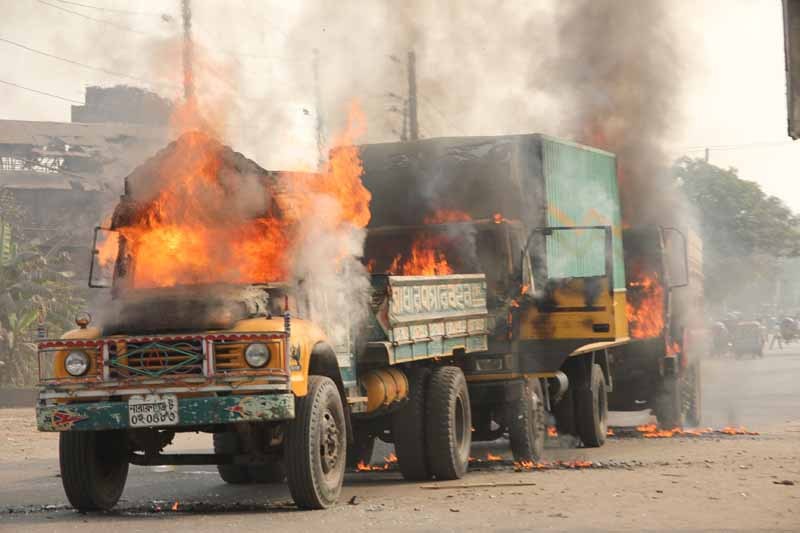 |
| Jamat e Islami activists in Bangladesh set four vehicles on fire in response to Abdul Quader Mullah's execution. Photo by Mahbubur Rahman Khoka. Copyright Demotix (13/12/2013) |
10 killed in Jamaat-Shibir men unleashed violence on political rivals in #bangladesh http://t.co/xjs1Xqr3Sn @UNHRC @amnesty #shahbag, — Istiaque Al Mahmud (@iamahmud) December 13, 2013Blogger and online activist Kallol Mustafa wrote that it is important to arrest the people involved in the Jamaat mayhem as soon as possible:
কুখ্যাত রাজাকার কাদের মোল্লার ফাঁসিকে কেন্দ্র করে বরাবরের মতোই জামাত সারা দেশে পরিকল্পিত ভাবে তান্ডব চালাচ্ছে- হিন্দু পল্লী,সরকারি প্রতিষ্ঠান, দোকান-পাট, ব্যাবসা প্রতিষ্ঠান, জানবাহন ইত্যাদি এই জামাতি তান্ডবের লক্ষ বস্তু । শুধু জামাতি সেন্ট্রাল কমান্ড নয়, গ্রাম-থানা-উপজেলা-জেলা-বিভাগ পর্যায়ের জামাত-শিবিরের ‘তান্ডব সংগঠকদের’ সমন্বিত প্রচেষ্টা ছাড়া এটা সম্ভব নয়। তাৎক্ষণিক ভাবে তান্ডব ঠেকানোর পাশাপাশি এই ‘তান্ডব সংঠকদের’ দ্রুত সানাক্ত করে গ্রেফতার ও বিচারের আওতায় আনা এখন সবচেয়ে জরুরী কাজ।
Jamaat has unleashed a wave of planned violence stemming from the execution of Quader Mollah. Hindu installations, government offices, private commercial premises, transport are the focus of their destruction. This requires a massive coordination between Jamaat central command and the arms of violence. So it is mandatory to resist the violence and rampage and arrest the masterminds.Pallab Muhaimen protested on Facebook:
কাদের মোল্লাকে Islamist leader বলা হচ্ছে দুই জায়গায়। এক. জামাত বলছে। আর দুই. পশ্চিমা গণমাধ্যম। পশ্চিমা গণমাধ্যমের শিরোনামে war criminal লিখতে কেন এত কষ্ট? ব্যতিক্রম হিসেবে রয়টার্স ও এএফপি তবুও কিছুটা যুদ্ধপরাধের কথা যুক্ত হয়েছে।
Quader Mollah is being named as an "islamist leader" on two fronts. One: Jamaat is propagating this. And two: the Western mainstream media. Why is it too hard to write "war criminal"? Only exceptions are Reuters and AFP who had mentioned about his war crimes.
December 05, 2013
Facebook Refused to Delete a Video on How to Make a Petrol Bomb
Thursday, December 05, 2013
No comments
During the recent political violence in Bangladesh there were many instances of petrol bomb attacks on public transport full of passengers which killed and injured many.
A video emerged in Facebook [bn] last May posted by a radical person on how to make a petrol bomb and throw it to political opposition and policemen.
The video also included violent messages (in Bengali) which was widely shared. A snapshot of the narrative:
A video emerged in Facebook [bn] last May posted by a radical person on how to make a petrol bomb and throw it to political opposition and policemen.
The video also included violent messages (in Bengali) which was widely shared. A snapshot of the narrative:
পেট্রোল বোমা বানানোর সহজ টিপস । জামাত, শিবির, হেফাজত সহ সকল ইসলামী আন্দোলনের কর্মীদের বলছি: অবশ্যই, অবশ্যয়ে, অবশ্যই অস্ত্র হাতে নেয়া মুসলমানের জন্য অবধারিত হয়ে পরেছে.Journalist Tasneem Khalil tried to report this video to Facebook. But Facebook refused to remove it and replied with this message:
An easy tip to make a petrol bomb. Calling Jamaat, Shibir, Hefazat and other Islami movement activists: It has become a must for the Muslims to pick up weapon and hit back..
How to make molotov cocktails and burn policemen! @Facebook refuses to delete this video -> http://t.co/jI4MQOGF5j pic.twitter.com/5MHGPK2D3j
— Tasneem Khalil (@tasneem) December 3, 2013
First Published in Global Voices Online.
December 04, 2013
‘How Many Burning Bodies Will Satisfy Them?': Political Violence in Bangladesh
Wednesday, December 04, 2013
No comments
[All links lead to Bangla-language webpages unless otherwise noted.]
The violent political crisis currently plaguing Bangladesh is having deadly consequences [en] for the country's people, who have borne the brunt of a series of politically motivated attacks in the last few weeks, such as the November 28 petrol bombing of a bus [en] full of passengers in Shahbag [en], near the center of capital Dhaka.
That attack killed three people, including a 10-year-old, and severely injured 15 others. Several others have died in similar incidents around the country.
The rash of violence began after Bangladesh's election commission declared at the end of November that parliamentary elections will be held on January 5, 2014. The opposition parties - Bangladesh Nationalist Party and Bangladesh Jamaat-e-Islami party - have rejected [en] the timetable, and are calling for the country's prime Minister to resign and for elections to be held under a neutral caretaker government.
The resulting protests and road blockades have at times turned violence, with activists hurling crude bombs at vehicles full of passengers or derailing trains [en] killing a number of innocent people. The violence in recent weeks has claimed more than 50 lives and left 2,000 people injured [en]. Several opposition leaders have been arrested during the protests on different charges, and a number of party activists have died during violent clashes with the police.
And everyday citizens continue to pay dearly for the discontent. In past weeks, people like Monir, Sumi, Montu Paul, Asad Gazi, Nasima Begum, Abul Quashem and others have lost their lives.
[Warning: Graphic images below]
Daily Prothom Alo report:
There have been uproar and condemnation across the country over the bloodshed. Blogger Fatema Johra wrote on Bangla blogging platform Amarblog:
Original in Bangla by Pantha Rahman Reza. Translated by author. First published in Global Voices Online.
The violent political crisis currently plaguing Bangladesh is having deadly consequences [en] for the country's people, who have borne the brunt of a series of politically motivated attacks in the last few weeks, such as the November 28 petrol bombing of a bus [en] full of passengers in Shahbag [en], near the center of capital Dhaka.
That attack killed three people, including a 10-year-old, and severely injured 15 others. Several others have died in similar incidents around the country.
The rash of violence began after Bangladesh's election commission declared at the end of November that parliamentary elections will be held on January 5, 2014. The opposition parties - Bangladesh Nationalist Party and Bangladesh Jamaat-e-Islami party - have rejected [en] the timetable, and are calling for the country's prime Minister to resign and for elections to be held under a neutral caretaker government.
The resulting protests and road blockades have at times turned violence, with activists hurling crude bombs at vehicles full of passengers or derailing trains [en] killing a number of innocent people. The violence in recent weeks has claimed more than 50 lives and left 2,000 people injured [en]. Several opposition leaders have been arrested during the protests on different charges, and a number of party activists have died during violent clashes with the police.
And everyday citizens continue to pay dearly for the discontent. In past weeks, people like Monir, Sumi, Montu Paul, Asad Gazi, Nasima Begum, Abul Quashem and others have lost their lives.
[Warning: Graphic images below]
Daily Prothom Alo report:
- শুক্রবার ভোররাত। ঢাকা-বগুড়া মহাসড়ক। যানজটে স্থবির পাঁচ শতাধিক গাড়ি। স্থানে স্থানে ককটেল, ইটপাথর নিয়ে নির্বিচার হামলা। নারকীয় তাণ্ডব। নারী-শিশু-বৃদ্ধ—কারও রেহাই নেই। আহত শতাধিক যাত্রী।
- শুক্রবার ভোররাত। ফেনীর দাগন-ভূঞায় নৈশকোচে হামলা। যাত্রীদের মারধর। টাকাপয়সা, মালামাল লুট। পেট্রল ঢেলে বাসে আগুন।
- শুক্রবার রাত একটা। রাজশাহী-নওগাঁ সড়কের দেওয়ানপাড়া। ধানবোঝাই চারটি ট্রাকে আগুন। আগুন ওষুধের গাড়িতেও।
বিএনপি-জামায়াতের নেতৃত্বাধীন ১৮-দলীয় জোটের হঠাৎ ৭২ ঘণ্টা অবরোধের খণ্ডচিত্র এটি। অবরোধের আগপাছ বিবেচনায় নেই। হামলা যেন অনিবার্য।
চট্টগ্রামের সীতাকুণ্ড, কুমিল্লা, চাঁদপুর—অবরোধের ডাক দেওয়ার আগে রাস্তায় নামা যাত্রীবাহী বাস, মালবাহী ট্রাকের ওপর হামলে পড়ার একই চিত্র সবখানে।
অপ্রস্তুত মানুষের ওপর পরিকল্পিত হামলা। মহাসড়কজুড়ে এক অবিশ্বাস্য রাজনৈতিক বর্বরতা।
- Friday [29 November, 2013] early morning. Dhaka-Bogura Highway. Around 500 vehicles were stuck in a traffic jam due to a protesting road blockade. Suddenly, they were attacked by small explosive devices and bricks. Massive violence. No respite for women and children. More than 100 passengers hurt.
- Friday early morning. Feni-Dagonbhuiyan night coach attacked. The passengers were beaten, robbed. The bus was torched after pouring petrol.
- Friday 1 a.m. in the morning. Dewanpara at Rajshahi-Naoga Road. Four trucks containing rice were torched. A van carrying medicine was not spared.
These are the snapshots of the 72-hour blockade undertaken by the [Bangladesh Nationalist Party and Bangladesh Jamaat-e-Islami] 18-party coalition. There is no innovation in the nature of protest. Seems violence and attacks are the norm.
In places like Sitakunda, Comilla and Chandpur, it's a common scene during the blockade that a passenger bus or delivery truck are attacked indiscriminately.
That's only one day. Since January 1, 2013, political violence has claimed 348 lives.Planned attacks on unprepared citizens. Political barbarism on the highways.
There have been uproar and condemnation across the country over the bloodshed. Blogger Fatema Johra wrote on Bangla blogging platform Amarblog:
মৃত্যুর মিছিল শুরু হয়েছে আমাদের দেশে।একটার পর একটা নিরীহ মানুষ যুক্ত হচ্ছে সেই মৃত্যুর মিছিলে। মাঝে মাঝে মনেহয় এই বুঝি আমিও যুক্ত হলাম সেই মিছিলে, এই বুঝি আমার স্কুল পড়ুয়া ভাইটা সেই মিছিলে হেঁটে যাচ্ছে।যতক্ষণ পর্যন্ত ভাইটা না ফেরে ততক্ষণ পর্যন্ত কান পেতে রাখি দরজায়, অপেক্ষায় থাকি কখন ও এসে বলবে- আপু, দরজা খোলো।আর অস্থির হয়ে ভাবতে থাকি ঠিক মতো ফিরবে তো ভাইটা! নাকি মনিরের মতো....আবার, হঠাৎ বাবার ফোন আসলে মনেহয়- বাবাই তো! নাকি অন্য কেউ বাবার মিছিলে যাবার খবর দিতে ফোন করল! কিন্তু যখন ফোনটা ধরে শুনতে পাই-"হ্যালো মামুনি" তখন মনটা শান্ত হয় এই ভেবে- নাহ, বাবা ভালোই আছে। কিন্তু তারপরও এক অসহ্য আতঙ্ক নিয়ে কাটাতে হয় সারাদিন,বাবা সুস্থভাবে বাড়ি ফিরবে তো!
A procession of death is marching through our country. One by one, innocent people are joining that procession. It occurs to me that I may be included in that at anytime, or my school-age brother. I anxiously wait for his return every day, wait for the call... "sister, please open the door". I hope that he would not end up... like Monir. Again... the phone rings and I think... is it Dad... or someone else has a bad news regarding Dad.questioned how much innocent passersby should be forced to bear:
[...] দেশে জমিদারী নিয়ে রক্তারক্তি চলছে। চলছে নানা নিষ্ঠুর খেলা। প্রতিদিন মানুষ মরছে, পুড়ছে! বেশিরভাগ মানুষ শুধু বেঁচে থাকার তাগিদেই বের হয়েছিলেন রাস্তায়। কতজন পঙ্গু হচ্ছেন তার হিসাবও পাওয়া যাবে না। এতো তুচ্ছ মানুষের জীবন! এতো উচ্চ লাটসাহেবদের খাই!!
Bloody violence to secure who will rule this land. A brutal conspiracy is being played. Every day people are being burnt, being killed! Most of these people were out on the streets during the blockade to earn their bread. There is no statistics for how many are losing their limbs due to injuries. How insignificant are these lives? The powerful are so greedy!Facebook user Shariful Hasan urged the political parties to end the animosity and leave the people out of it:
ঘেন্না হচ্ছে তাদের প্রতি যারা জনগনের নাম ভাঙ্গিয়ে ক্ষমতায় যাওয়ার কিংবা টিকে থাকার নোংরা রাজনীতি করেন। ঘেন্না তাদের প্রতি যারা নিজ দেশের মানুষকে আগুনে পুড়িয়ে মারেন। ঘেন্না তাদের প্রতি যারা আমার এই দেশটাকে অশান্তির আগুনে পোড়াচ্ছে। মাননীয় দেশপ্রেমিক রাজনীতিবিদদের কাছে আকুতি আপনারা ক্ষমতায় যাওয়ার জন্য নিজেরা কামড়াকামড়ি করেন, কিন্তু সাধারণ জনগনকে দয়া করে মুক্তি দিন। আমরা একটু শান্তিতে থাকতে চাই।
I loathe those who play dirty politics with the voters to stay in power. I despise those who burn their own countrymen. I reject those who are destroying peace in our country. My petition to the patriotic politicians: Please free the citizens from your war for power. We want to live in peace.Sardar Faruk wrote how fear now grips people on their daily commutes to work:
মৃত্যুর ঝুঁকি নিয়েও অফিসে যেতে হয়। আজ সকালে বাসে উঠে সহযাত্রীদের দেখছিলাম। কারো মুখে কোনো কথা নেই, কী এক আশঙ্কায় জানালাপথে তাকিয়ে আছে। নিজেকে প্রিজনভ্যানের এক ফাঁসির আসামী বলে মনে হচ্ছিলো।
We have to run the risk of death to go to the office. I was observing my fellow passengers on the public bus this morning. Nobody was talking, but were rather looking out the window in anticipation of an unknown fear. It felt like I was a death penalty convict in a prison van.Blogger Arif Jebtik also reiterated the fear of a bomb being hurled by the protesters:
বউয়ের কাজ ঢাকা ভার্সিটিতে, আমি যাব ঢাকা রিপোটার্স ইউনিটির নির্বাচন দেখতে। একই রাস্তায় এরকম পড়লে একটু সময় এডজাস্ট করে দুজনে একসঙ্গেই যাই। আজকে সকালেও ওভাবেই রেডি হচ্ছিলাম। বের হওয়ার ঠিক আগে বিছানায় ঘুমন্ত বাচ্চাটাকে দেখলাম। আমি বললাম, 'তুমি আলাদা যাও, আমি আলাদা যাই।' এই দাহকালে দুজনেই একসঙ্গে শিককাবাব হয়ে গেলে চলবে না। আলাদা আলাদা গেলে অন্তত একজন টিকে থাকতে পারবে আগামী প্রজন্মের জন্য।
My wife would go to Dhaka University campus; I would go to watch the election of the Dhaka Reporters Union. We usually go together when we have to go in the same direction. This morning was no different. But our sleeping child caught our eyes while we were leaving. I said "let's go separately." In this crazy time, it's not a good idea to risk being killed together. If we go separately, worst case scenario at least one of us would survive to take care of the next generation.Blogger Lina Ferdous accused politicians of scheming to climb over dead bodies in order to hold on to power:
আর কত মানুষ পূড়লে সফল হবে এই অবরোধ...আর কত মানুষ মরলে জেগে উঠবে মনূষত্য বোধ... এভাবে ধুকে ধুকে মরার চেয়ে আসেন সবাই একসাথে পুড়ে মরি...আমাদের চিতায় তারা সিংহাসন সাজাক...
How many men would die to make this blockade a success.. How many would die to awaken humanity?.. Instead of being burnt one-by-one, let's burn together.. Let them decorate their throne with our cremation fire...On Twitter, Falguni Mitu asked:
How many burning bodies will satisfy them? How much blood they want to see before they stop? #JS_polls #shahbag
— Falguni Mitu (@mashamiah) November 29, 2013
Dipon Mitra and Anulikhon tweeted:
RT @AnuLikhon: অবরোধের মধ্যে ঢাকায় বাসে আগুন http://t.co/dSyGUmWeQ1 আগুন তো খালি বাসেও দেওয়া যায় , সাধারন মানুষের গোয়া মেরে লাভটা কি?
— Dipon Mitra (@light_0n) November 28, 2013
RT @AnuLikhon A bus in Dhaka has been torched http://t.co/dSyGUmWeQ1 You can also torch an empty bus, why the assault on passengers?Blogger Sohail Jafar (@banglapress) asked the politicians to self-immolate rather than burn others:
বিএনপি নেতারাও দাবি আদায়ের জন্য নিজেদের শরীরে আগুন লাগিয়ে আত্মাহুতি দিতে পারেন... http://t.co/BPRQK6f1Et
— Soheil Zafar (@banglapress) November 12, 2013
The opposition leaders can self-immolate to get what they want..... http://t.co/BPRQK6f1EtThe opposition leaders have said in their political speechs that they are undertaking steps like blockades and strikes to establish democracy. Mahbubul Alam Shohag (@Mahaburs) criticized this point:
গণতন্ত্র মানার সময় নাই। আগে নিজেকে বাঁচাই।
— Mahabur Alam Shohag (@Mahaburs) November 30, 2013
No time for pseudo-democracy. Let us save ourselves firstJournalist J. E Mamun (@mamunzi) asked:
এর নাম গণতান্ত্রিক অধিকার? বিএনপি, আওয়ামী লীগ, জামাত-শিবিরসহ যারাই হরতাল অবরোধের নামে রেল লাইন উপড়ে ফেলা, আগুন... http://t.co/j7EthXtu9r
— Za E Maumun (@mamunzi) November 27, 2013
Is this a democratic right? The political parties which derail trains by damaging tracks, torching buses...Shaugat Ali Sagor blames the government, writing on Facebook:
বাসে আগুন দিয়ে মানুষ পুড়িয়ে,রেল লাইন উপড়ে ফেলে সারা দেশে যারা নৈরাজ্য সৃষ্টি করছে, তাদের ধরতে পারছে না কেন সরকার? মানুষের জানমালের নিরাপত্তাই যদি দিতে না পারে তাহলে সরকারের অস্তিত্ব থাকে কোথায়? সন্ত্রাসীদের ধরতে না পারলে সরকারের উচিত জনগনের কাছে ক্ষমা চেয়ে ক্ষমতা থেকে সরে যাওয়া। রাজনীতির নামে এই ধরনের পৈশাচিকতা চলতে দেওয়া যায় না, চলতে দেওয়া উচিত না।
Those who are creating anarchy by burning people, uprooting railway tracks, why is the government failing to nab them? If they cannot provide the security, then what is the purpose of the government? If they cannot catch the terrorists, they should apologize and resign from power. The barbarism in the name of politics cannot continue.Suman Kaisar asked everyday people to start protesting:
মানুষের তরে কি কেউ নেই ? সবাই কী পশুত্ববরণ করেছে? কোন দল বা প্রতিষ্ঠানের কাছে না। শুধু মানুষের কাছে দাবি জানাচ্ছি রুখে দাঁড়ান। প্রতিরোধ করুন যারা মানুষ পোড়ানোকে রাজনৈতিক কর্মসূচি বলে চালিয়ে দিতে চায়। আপনার যতটুকু সামার্থ্য তা দিয়ে প্রতিবাদ করুন। যারা আমাদের মা-বাবা-ভাই-বোন বা স্বজনকে পোড়াচ্ছে তাদের বিরুদ্ধে কিছু না কিছু করুন। নিজেকে আর কত লুকিয়ে রাখবেন? আর কিছু না পারেন ওদের বিরুদ্ধে অন্তত ঘৃণার একদলা থুথু ছিটিয়ে দিন। না কি তাও পারবেন না????
Is their no one for humanity? Have we all become animals? No groups or organizations? I urge people to take back the country. Resist those who endorse burning innocent people as a political act. Please resist them with all your might. Those who are burning our fathers, mothers, sisters, brothers or relatives, please do something against them. How long will you be running away? If you cannot do anything, just spit on them. Can't you even do that?Different groups and organization are arranging small protests against these attack on innocent people. A Facebook event has been created titled "Stop burning people in your war for power" by a group called Citizens Resisting Violence. They arranged a protest rally in Shahbag area on December 3, 2013.
Original in Bangla by Pantha Rahman Reza. Translated by author. First published in Global Voices Online.
December 01, 2013
High-Profile Editor Tarun Tejpal Accused of Sexually Assaulting Young Reporter
Sunday, December 01, 2013
No comments
The celebrated editor-in-chief of Indian magazine Tehelka, known for its groundbreaking investigative journalism and coverage of issues such as corruption and sexual violence, has been arrested on charges that he sexually assaulted a female colleague.
The allegations against Tarun Tejpal, an iconic figure of Indian journalism who led his media organization Tehelka to popularity, first came to light when an email from the victim, a Tehelka reporter and friend of Tejpal's daughter, written to the magazine's managing editor describing the alleged assault was leaked. The victim later resigned from her post, saying that she was "deeply traumatized" by the magazine's lack of support.
Initially, Tehelka Managing Editor Shoma Chaudhury, who has since quit in the wake of the scandal, seemed to defend him and said the organization would undertake internal inquiries. As penance, Tejpal sent an "apology" letter on 20 November 2013 to Tehelka management announcing that he would be stepping down for six months in light of allegations. In the letter, he defended himself, saying that "a bad lapse of judgment, an awful misreading of the situation, have led to an unfortunate incident."
The accusations have created uproar in mainstream media as well as social media, especially among the Twitterati. His fall from grace has been termed "The Fall Of India's Conscience", and the constant conversation in social media has acted as a catalyst in escalating the debate.
Nayanathara, an India Today Reporter, wrote on Google Plus [malayalam]:
The allegations against Tarun Tejpal, an iconic figure of Indian journalism who led his media organization Tehelka to popularity, first came to light when an email from the victim, a Tehelka reporter and friend of Tejpal's daughter, written to the magazine's managing editor describing the alleged assault was leaked. The victim later resigned from her post, saying that she was "deeply traumatized" by the magazine's lack of support.
Initially, Tehelka Managing Editor Shoma Chaudhury, who has since quit in the wake of the scandal, seemed to defend him and said the organization would undertake internal inquiries. As penance, Tejpal sent an "apology" letter on 20 November 2013 to Tehelka management announcing that he would be stepping down for six months in light of allegations. In the letter, he defended himself, saying that "a bad lapse of judgment, an awful misreading of the situation, have led to an unfortunate incident."
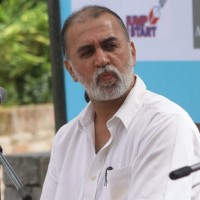 |
| Tarun J. Tejpal. Image by Sunil Sharma. Copyright Demotix (17/9/2011) |
Nayanathara, an India Today Reporter, wrote on Google Plus [malayalam]:
Feel ashamed how that young girl would have idealized Tarun Tejpal. For him, it seems like fun after a couple of drinks. After assaulting a woman half his age and then coming up with excuses is nauseating to say the least. After the Delhi rape case, Tehelka had published excellent stories, now I wonder what exactly was Tehelka's editorial orientation regarding women's rights. Also shocking is the fact that there are less people on this earth whom one can trust.IT professional KrishnaKumar was worried about the way the matter was hushed up inside Tehelka:
It's despicable and disappointing how sexual harassment towards women is treated among the so-called liberal media and elite. Instead of being a modal in such issues, they are trying to shift the blame. It is a big blow to the public's faith in the fourth estate. Tarun Tejpal has clearly assaulted the woman, it should be treated with all the seriousness of a sexual crime. This is not something which should be dealt with internally in Tehelka.The larger issue to this debate relates to how safe Indian women are in their workplaces. The Tejpal case has prompted some women to come forward. A former female employee of MY FM has filed a sexual harassment case against the company's CEO Harish Bhatia. Former judge of the Supreme Court, A K Ganguly, have been accused by a law intern of sexual harassment. And these are just the tip of the iceberg. Nivedita Menon wrote at Kafila blog:
The silence around the normalizing of a range of behaviour from the apparently casual to the outrightly violent. The laughing sexual innuendo; the misogynist jokes; the well-known ‘displaced squeeze’ of the upper arm, the shoulders; the repeated, relentless expression of romantic or sexual interest despite clear NO’s; the grabbing of the breast, the unwanted kiss, the out-of-town work trip ending in physical assault, presented as flattering interest; and through it all, the clear invocation of the power relationship. A young woman journalist is told to ‘seduce’ someone to come to a high profile event by her female boss. When she protests at this terminology, the boss tells her not to be so sensitive. To have a sense of humour. And these are just the upper class professionals. The routine sexual violence faced by women on construction sites and inside middle class homes where they work as domestic servants, and in every other kind of working class location is of course, even more normalized.The Sexual Harassment of Women at Workplace (Prevention, Prohibition and Redressal) Act, 2013 was promulgated earlier this year by the Indian parliament providing much hope. But the law is not operational as the concerned ministry failed to notify the legislation, a required step before a law is considered to be in effect. Shashi Tharoor (@ShashiTharoor), Minister of State for Human Resource Development, wrote that he is against the public vilification of the accused:
A few truisms: Silence is not support. Outrage&concern don't have2be public. All accused are entitled to due process. Justice must be done.
— Shashi Tharoor (@ShashiTharoor) November 24, 2013
Blogger Shivam Vij (@DilliDurAst) tweeted:
Pakistani columnist Ayesha Siddiqa (@iamthedrifter) withdraws her fortnightly column in @tehelka to protest their handling of Tejpal case
— Shivam Vij (@DilliDurAst) November 23, 2013
Sri Lankan blogger Indrajit Samarajeeva noted that such abuses are natural for men in powerful positions. Commenting on the accusations on Tejpal, the blogger wrote:
What’s sad is this is perfectly normal behavior for a lot of powerful people. I don’t necessarily think a man should be destroyed for abuse like this, but it needs to be punished, they need to be rehabilitated and other men have to know that it’s not OK. The urge and ability are there, but until God-AI makes it an immediate smiting, this type of public condemnation is necessary and far too infrequent.Shivam VJ noted that despite having strict laws at their disposal, women are afraid of these men in power. Maybe one day cases like these will inspire victims to speak up.
November 27, 2013
The camera doesn't make the photographer
Wednesday, November 27, 2013
No comments
When some people buy a new shiny entry level DSLR camera they go out and take 1000+ photos. They load the photos on PC, try to learn a bit of Photoshop and think why don't these look like the ones in the magazines.
They then Google for photography tutorials, read about composition, focus, aperture, shutter, ISO and lots of other things. A year down the line they start taking better photos and they don't take as many photos as before. They take about 100 photos and store a quarter of them as outstanding. After sometime they think of upgrading to full frame. The quality blows them away.
It must be the camera. An entry level DSLR user must upgrade to a full frame only to find they are no better but out of 1000 shots there is the odd good one that if they tweak it in PhotoShop. They put them on social network and think lots of people are looking at them so they must be good.
The moral of the story is to be a good photographer you have to put the work in. Its not (only) the tool but the skill and experience, which are required. Give an experienced photographer a cheap point and shoot, and an inexperienced beginner an expensive DSLR and the experienced photographer will still take better photos.
So what do you need to be a good photographer?
As for me I am yet to do all of above to start taking better pictures.
My Flickr photostream
They then Google for photography tutorials, read about composition, focus, aperture, shutter, ISO and lots of other things. A year down the line they start taking better photos and they don't take as many photos as before. They take about 100 photos and store a quarter of them as outstanding. After sometime they think of upgrading to full frame. The quality blows them away.
Or
It must be the camera. An entry level DSLR user must upgrade to a full frame only to find they are no better but out of 1000 shots there is the odd good one that if they tweak it in PhotoShop. They put them on social network and think lots of people are looking at them so they must be good.
The moral of the story is to be a good photographer you have to put the work in. Its not (only) the tool but the skill and experience, which are required. Give an experienced photographer a cheap point and shoot, and an inexperienced beginner an expensive DSLR and the experienced photographer will still take better photos.
So what do you need to be a good photographer?
- You need passion. You need to be obsessed with getting the shot.
- Read photography tutorials, go for a Photo-walk
- Find a mentor, get critics feedback
- Understand your camera and all its features, upgrade when you outgrow its capabilities
- Take your camera everywhere
- You need to be a story teller.
- You need patience and lots of it.
- You need to show your photos to everyone.
- Develop a style of your own.
As for me I am yet to do all of above to start taking better pictures.
My Flickr photostream
November 26, 2013
Uncertainty And Hope During Elections in Nepal
Tuesday, November 26, 2013
No comments
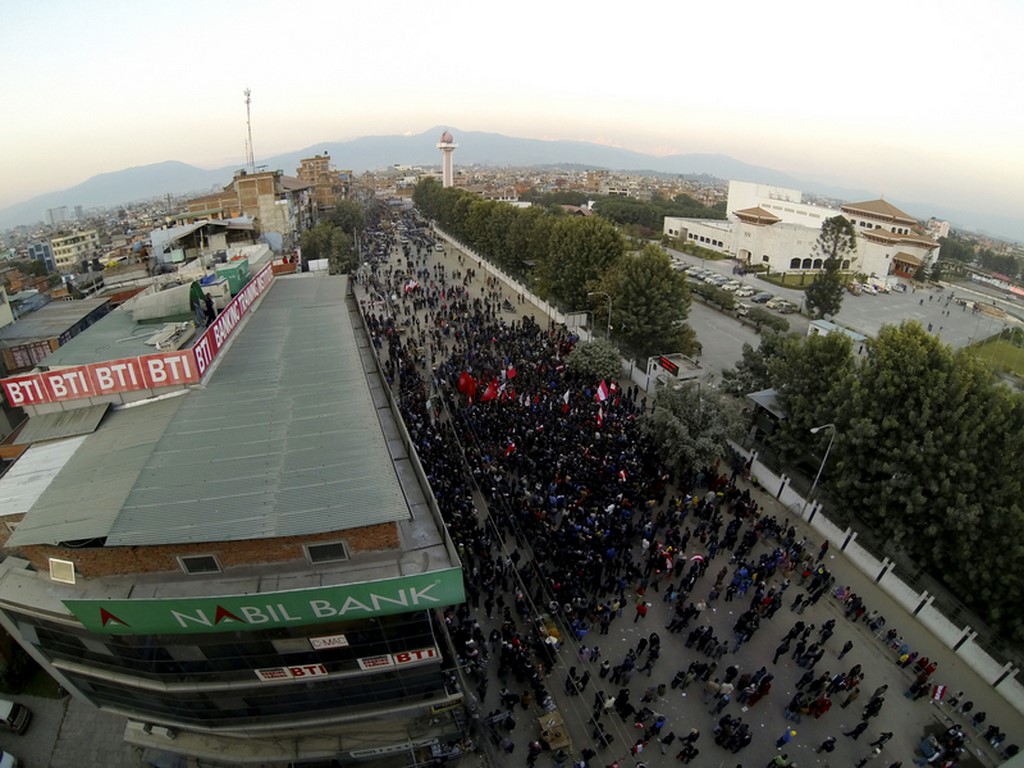 |
| Supporters of different Nepali political parties outside BICC building where vote counting is continuing. Image by Kumar Shrestha. Copyright Demotix (21/11/2013) |
The elections are shrouded with uncertainty as the Unified Communist Party of Nepal (Maoist) has alleged vote rigging. The Communist Party of Nepal (United Marxist-Leninist) and Nepali Congress are neck-and-neck, while the Maoists face electoral defeat.
Much rides on these elections because the new assembly will be tasked with drafting Nepal's much awaited Constitution. Not long after a decade-long civil war between the country's Maoists and government came to an end, the first Constituent Assembly was formed in 2008. But after four years it failed to write a constitution, and the country has been in political crisis since.
The voter turnout on the day was encouraging, with a large women participation. Blogger Ushaft discussed the general mood of voters on the voting day:
People who voted for Maoists last time have turned against them now. This is the general mood one can observe in districts, villages and streets.However, the day did not pass without violence. Journalist and blogger Deepak Adhikari blogged about an election day bomb blast that severely injured children playing in the streets. There has been an increase in election-related violence in Nepal both pre-poll and during the poll, noted by blogger Ushaft:
A series of violent explosions were reported last week. It is not clear who did them, and most blame the Dash faction. But a large number of such activities are targeted at non-Maoist candidates.Aakar Post analyzed social media reactions regarding the elections. The pre-election buzzwords were topped by words such as "bomb":
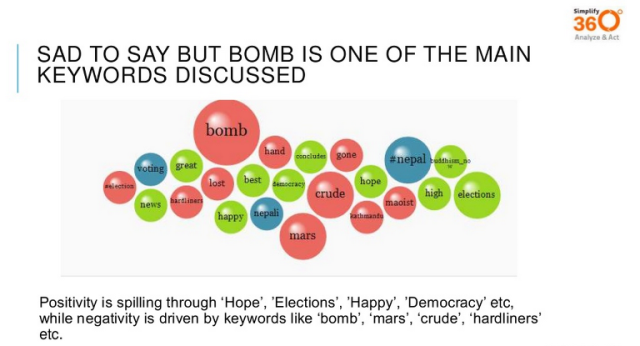 |
| Analysis of pre-election keywords in Social Media. Image by Aakar Tech. Used under a CC BY-NC license |
Nepal’s Maoists are disputing the election results. Previous Prime Minister and Unified Communist Party of Nepal (Maoist) leader Pushpa Kamal Dahal (Prachanda) urged the election commission to stop the vote counting with complaints of “conspiracy and poll-rigging.”
On Facebook, Maoists leaders and supporters - notably Prakash Dahal (Prachanda's son) - have posted series of updates regarding their allegation of irregularities. Prakash Dahal has also posted pictures which he claims prove that the pools were not free. He has posted four photos of what purportedly show an army officer standing next to voters casting ballot. Nepal deployed 62,000 army personnel in all the constituencies to provide security for the November 19 Constituent Assembly elections.
But majority of comments posted seem to indicate that the people want the Maoists to take this defeat as a lesson:
निष्पक्ष चुनाव भनेको यहि रहिछ हैन । सेना कुन घेरामा बस्ने रे । निलकण्डलगायत षडयन्त्रकारीहरु । ब्यारेकमा मतपेटिका साटेर नपुगेर सेनालाई कहां भोट हाल्ने सिकाउन लगाउन
This is free and fair election. Which boundary would the Army abide by? Nilkantha [Chief Elections Commissioner] and the other perpetrators? Not happy with changed ballot boxes in barracks, made the Army teach voters where to vote.Blogger Ushaft quotes a citizen's statement, which expressed concern on the Maoists allegation of election irregularities and rejected demands of the Maoists to obstruct the vote tallying process.
On Twitter, the #NepalVotes hashtag was used by many commentators to write about the elections. NepalVotes.com is on the forefront of disseminating and visualizing election-related data, and a popular Nepali-language blog has coordinated coverage with them:
Dear @salokya, This is the best data play /w #NepalVotes I've seen during this elex coverage. Keep up the good work. http://t.co/v1b6LkPk2b
— Subel (@svbel) November 23, 2013
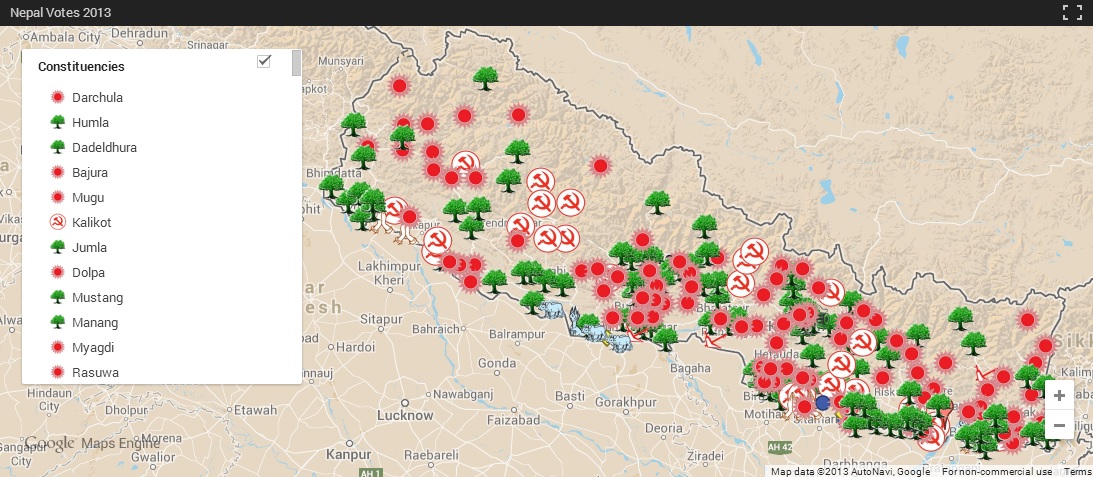 |
| Screenshot of the website Nepalvotes.com with graphical representation. |
Blogger and journalist Deepak Adhikari (@DeepakAdk) noted on Twitter:
interesting infographics on twitter trends RT @leplan: Social Media Buzz Analysis on #NepalVotes http://t.co/s55A597Zan
— Deepak Adhikari (@DeepakAdk) November 23, 2013
Interesting to note that otherwise active Twitter user, former Prime Minister Baburam Bhattarai (@brb_laaldhwoj), has remained silent following the results. He tweeted just once after the polls, to thank his voters.Paramendra Bhagat at Democracy for Nepal provides a snapshot of the latest standings as on 25 November 2013:
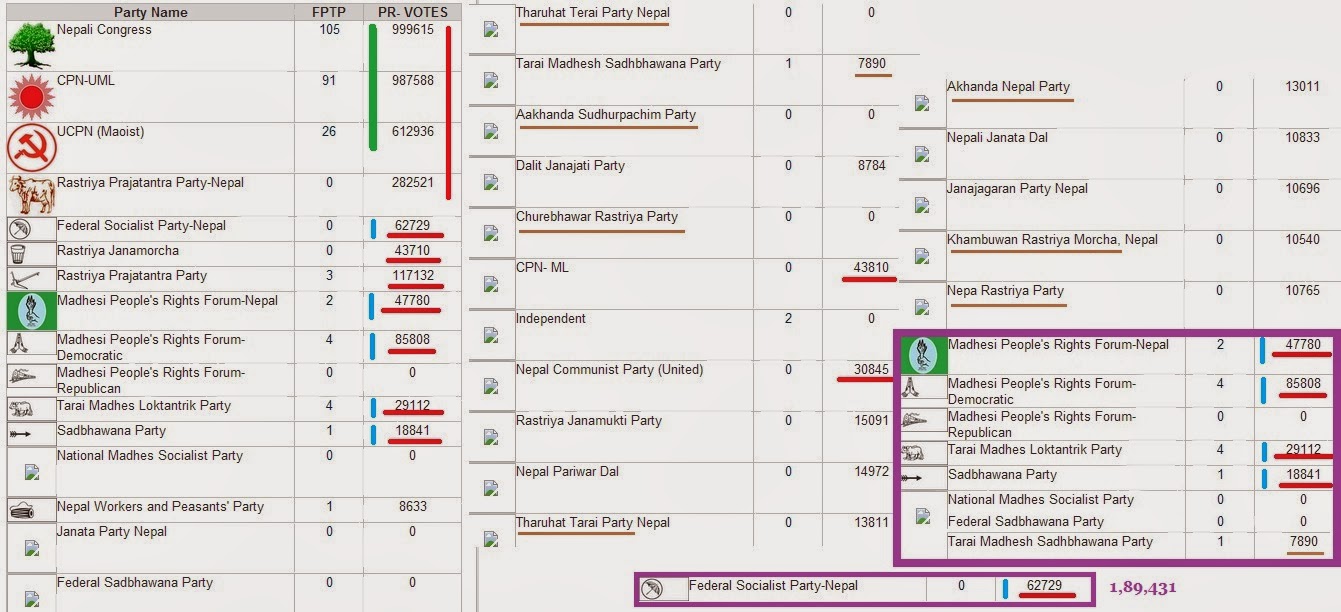 |
| Image courtesy Paramendra Bhagat at Democracy for Nepal. |
It's still not clear if these elections will result in a constitution, blogger Kaja wrote:
What I heard from some Nepali people was that for this election they hoped for a constitution. That was their biggest wish. Now only time will show what will happen.
First published in Global Voices Online. Bhumika Ghimire also contributed to this post.
November 22, 2013
Google Translation bot in Bangla
Friday, November 22, 2013
No comments
Today I met him. He was blinking in my Google chat list. I became very curious and googled the email address en2bn@bot.talk.google.com. Then I found out that its a bot, translation bot to be precise.
Google launched its first translation bots back in 2007. More than 20 languages had a translation bot by 2008. I don't know when they launhced the Bangla bot. But there is another similar bot (eng2ban@appspot.com) available.
 Here is a glimpse of the Bangla bot I encountered. According to Google:
Here is a glimpse of the Bangla bot I encountered. According to Google:
Google launched its first translation bots back in 2007. More than 20 languages had a translation bot by 2008. I don't know when they launhced the Bangla bot. But there is another similar bot (eng2ban@appspot.com) available.
 Here is a glimpse of the Bangla bot I encountered. According to Google:
Here is a glimpse of the Bangla bot I encountered. According to Google:Translation Bots will translate your messages from one language to another. These bots are named using two-letter language abbreviations formated as '[from language]2[to language@bot.talk.google.com,' and all available combinations are listed in the table below. For example, if you send 'Hello' to en2es@bot.talk.google.com (English to Spanish), it will respond with 'Hola.'You can see from the screenshot that the quality of translation is still catching up. So you can't rely on it fully.
November 17, 2013
PHOTOS: Dhaka's Beautiful Blue Sky Briefly Takes Over Web
Sunday, November 17, 2013
No comments
 |
| White patches of cloud drifting in the sky. A lonely bird is flying. Image by Ashraful Alam, Baily Road, Dhaka. Used with permission. |
Such was the scene on 17 November, 2013, with the striking beauty of the sky overwhelming the horizon above Bangladesh's capital city Dhaka. Talk of the stunning sight spread like wildfire on social media as netizens shared their beautiful images on Facebook and Twitter, some using the #Dhakasky hashtag.
Even some newspapers featured them. Journalist and blogger Simu Naser (@simunaser) wrote:
বাপরে, নিউজফিড দেখে মনে হচ্ছে আজকাল সবাই কাজ কাম ফেলে আকাশের দিকেই তাকিয়ে থাকে। এটা ভালো। — Simu Naser (@simunaser) November 17, 2013
Oh no. Looking at newsfeeds, it seems everybody is watching the sky leaving all their work. This is good.Torongo (@ttorongo) said:
আকাশ দেখে মুগ্ধ হয়েছিলাম বিকেলে, নীল সাদার সুষম কম্বিনেশন পুরো আকাশ জুড়ে।এখন দেখি ব্যাপারটা অনেকেই দেখছে,#ঢাকাস্কাই হ্যাশট্যাগও দেখলাম — Torongo M (@ttorongo) November 17, 2013
I was amazed by the sky in the afternoon, it was a combination of blue and white stretching to the horizon. Now it seems that everybody's noticing it. Even saw the #Dhakasky hashtag.Shafiul Alam (@shafiulnub) appreciated the moon too:
দিনের বেলায় জিরাম এট্টা আকাশ ছিল, এখন সিরাম এট্টা চাঁদ উঠছে। — Shafiul Alam (@shafiulnub) November 17, 2013
During the day, the sky was beautiful, now the moon is stealing the show.Atif M Safi tweeted an Instagram photo of the sunset:
The beautiful #sky today at #sunset #cloud #skyviewers #dream_sunset #lifeisgood #godhuli @ Dhaka | ঢাকা http://t.co/2lXbtcz3CW — Atif M Safi (@Atif_Safi) November 17, 2013Others also shared photos of the sky on Twitter:
#Dhaka landscape #Bangladesh pic.twitter.com/yPvGOjxUME — Ahmede Hussain (@ahmedehussain) November 17, 2013
Bird of prey... Dhaka Sky #dhakasky (at Nitol-Niloy Tower) [pic] — https://t.co/2ewwpn7CvN — Simon Templer (@thewickedsaint) November 17, 2013Many users uploaded pictures of the #Dhakasky. Global Voices republishes some with permission:
 |
| Nice cumulonimbus cloud, ideal for kite flying. Image by Tanmoy Kairy, Dhanmondi, Dhaka. |
 |
| The sky at home. Image by ahmedur Rashid Tutul. |
 |
| Who has floated the white cloud boats in the sky? Image by Suronjona Haque. |
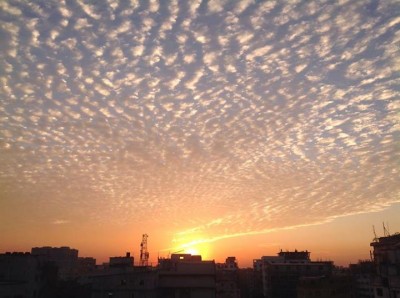 |
| The color of dusk on the sky. Image by Hasan Ahmed Khan. Mirpur, Dhaka |
 |
| The sky has colored itself. Image by Manju Ahmed. Mohammadpur, Dhaka. |
Original in Bangla by Pantha Rahman Reza. Translated by the author. First published in Global Voices Online
November 07, 2013
Mobile App Offers Indian Women Lifeline in Fight Against Rape
Thursday, November 07, 2013
No comments
Rape is the most common crime against women in India, where the number of rape cases have doubled between 1990 and 2008. Amidst the search for a solution, people are turning to technology, such as easy-to-use and free mobile application for the ubiquitous cell phone.
The Smart Suraksha App is an Android application focused on giving Indian women a greater sense of security. It can send a distress message to five pre-chosen contacts at the press of a single button. Along with the message for help, it also sends information about the user's current location even if the GPS option on the cell phone itself is switched off. Thus, women can be reassured that their call for help will always reach someone.

Indian blog directory Blogadda recently arranged a blog competition titled "I wish I had Smart Suraksha" to spread the words.
Kalyan Panja, a contestant, wrote about the app:
Blogger Prava Vathi, another contestant, wrote:
Shivani Gayal provides a list of other apps that are similar to Smart Suraksha.
Check out more submissions to the contest in the comment section of this post and on this Facebook page.
First published in Global Voices Online
The Smart Suraksha App is an Android application focused on giving Indian women a greater sense of security. It can send a distress message to five pre-chosen contacts at the press of a single button. Along with the message for help, it also sends information about the user's current location even if the GPS option on the cell phone itself is switched off. Thus, women can be reassured that their call for help will always reach someone.

Indian blog directory Blogadda recently arranged a blog competition titled "I wish I had Smart Suraksha" to spread the words.
Kalyan Panja, a contestant, wrote about the app:
The App has as main objective to make smartphones, today a commonly used tool, a valuable ally for the safety of women in situations of potential or actual danger, providing a simple and timely aid, such as sending SMS rescue, and a set of rules that allows us to take conscious behaviour in case of need. [..] The program allows to configure a list of 5 phone numbers to send a standard text such relief message (along the lines of: "I'm in trouble, call me!"), as well as to communicate your location, using GPS technologies or relying on a network Wifi. [..] The operations are designed to be carried with ease and in the shortest possible time, precisely in order to ensure the use of the app also under difficult and uncomfortable situations. The focus is directed on prevention, with tips and tricks that they do not want in any way undermine women's freedom, but to advise the appropriate behaviors to be taken in dangerous conditions in the interests of defense.
 |
| Click the image for link to the app |
This app is primarily created for women’s safety, which can track your whereabouts and at a single touch will text to the pre-listed five contacts simultaneously and also the police. It comes with an additional feature to give details of the would-be offender, and allows you to record info like model of the car or clothes he is wearing, in your text, provided if you are in such a situation. Use this app as a weapon that can prevent you from becoming an unfortunate victim.Blogger Confused Humanity wondered if an application like Smart Suraksha would have made a difference in the lives of rape victims:
The BPO employee who was raped and killed by the car driver, who changed the route and took her to a remote place. If she had this app with her, could she have alerted her friends/family or company authorities. With the approximate GPS location, could they have found her and saved her life? In the case of the latest Mumbai rape case, could the victim or her friend have pressed the button and alerted their company or friends about the suspicious behavior of the culprits, without inviting their attention and could the tragedy been have averted?The blogger also suggested additional features, such as recording the snapshot of the perpetrator:
Now only if the state would set up a helpline or something, that could accept and act on such emergency messages (which comes with the location of crime) by informing the nearest police station or patrolling team(or medical centers), wouldn’t it be a miniature emergency service system like the ’911′ in itself?Afshan Shaik asked in a poem, "if only people were smarter than the apps":
If only people were smarter than the apps.
If only every one had the courage to face the mobs.
If only wits, actions and bravery over powered the fear.
If only we had super powers we would have saved a tear.
If only every one was loved , protected and fathered.
If only instead of an app a fellow human being bothered!Your confidence is the best weapon, says Knitha Urs, and this app can give women the confidence. Its better to be prepared than be sorry, reminds Swati.
Shivani Gayal provides a list of other apps that are similar to Smart Suraksha.
Check out more submissions to the contest in the comment section of this post and on this Facebook page.
First published in Global Voices Online
October 27, 2013
Legendary Indian Playback Singer Manna Dey Dies
Sunday, October 27, 2013
No comments
Legendary Indian singer Manna Dey, whose original name was Prabodh Chandra Dey, died of a heart attack in Bangalore on October 24, 2013. He was 94. Dey recorded more than 4,000 songs during his career spanning from 1942 to 2013, and was famous for his playback work, recording songs for hundreds of movies for actors to lip sync to.
He sang mainly in Hindi and Bengali, and ventured into several other Indian languages. The singer was popular in both India and Bangladesh.
Netizens revisited his memory after his demise.
Venkataramanan Ramasethu, an academician and blogger, remembered him:
Journalist Abhinay Dey recounted a legendary song of Manna Dey that was popular among Bengalis which narrates the story of seven friends who met regularly at the legendary Coffee House at College Street Kolkata. The Coffee House has a historical significance for being the rendezvous of numerous scholars, editors, artists and writers based in Kolkata:
A legendary icon and a musical genius on his own right who ruled the bollywood musical arena close to 40 years, at times I felt he was an unsung hero.Akash Upadhyay posted 10 lesser-known facts about the legendary singer. Radio jockey, author and blogger Reema Moudgil noted:
So many songs. So many versions of one, exceptional voice.India Today (@IndiaToday) portrayed Manna Dey's career in numbers:
RIP, Manna Dey! A musical career in numbers pic.twitter.com/bJfqv8I0Hb — India Today (@IndiaToday) October 24, 2013Writer and blogger Madhulika Liddle in a tribute post for Manna Dey wrote:
That is what I love and admire about Manna Dey: his versatility, his immense range of songs, his ability to imbue his songs with so much emotion—whether that emotion was a deep love for one’s motherland, or pathos, or a rollicking don’t-give-a-damn. This was the man after one of whose songs a restaurant chain (Bhojohorimanna) was named. An era has gone. Manna Dey, the last of the great male playback singers of the golden years, has passed on. His voice will live on, though, and that will be some consolation. Some.
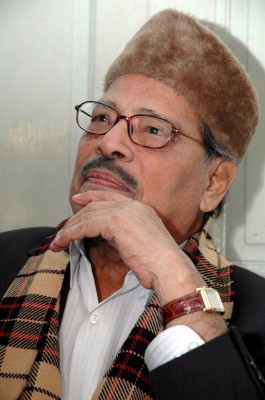 |
| Image by D Chakrabarty. Copyright Demotix |
The song penned by Gauriprasanna Majumdar recounts the Coffee House days of seven friends, who sat over endless cups and cheap charminar cigarettes burning between their lips with dreams to make it big. But life has taken a toll on them, DSouza is now dead, Amal is dying of cancer, Rama is in an insane asylum betrayed by his lover, Sujata is married to a rich man, Nikhilesh is in Paris and Moidul has gone back to Dhaka. The seventh friend is the unnamed narrator pining for the old carefree days of Coffee House. There is not a time when I don’t get a lump in my throat listening to this song. The pain in his voice makes you die with DSouza, the guitarist of Grand Hotel, it makes you suffer as Amal, the failed poet, it makes you stare at nothingness like the insane Rama, the love less, failed actor.He was also popular in Bangladesh. Blogger Professor Hijibijbij at Sachalayatan wrote:
আমার কৈশোর আর তারুণ্যের উদ্দাম দিনগুলিতে অবিচ্ছেদ্য সঙ্গী ছিল মান্না দের গান। সঙ্গী এখনো। কৈশোরের সেই দিনগুলি ছিল অসাধারণ - সারাদিন গান শুনতাম। দিন যেত, আর আমি একের পর এক আবিষ্কার করতাম মান্না দের গাওয়া এক একটি গান। গান তো নয় যেন সুরের জাল দিয়ে গেঁথে তোলা শব্দের মালা, যা অবলীলায় প্রকাশ করে আমার মনের একান্ত অনুভূতিগুলো! বাসার পুরানো ক্যাসেট প্লেয়ারে আমি শুনি মান্না দের গান। একবার শুনি, বারবার শুনি, কিন্তু গান পুরানো হয়না।
Manna Dey's songs were close to me during my adolescent days. They still accompany me. I listened to his songs everyday back then. As the day progressed I discovered more of his songs. Songs like necklaces of words sewn with music, which expressed my intimate feelings. I still listen to his songs in an old cassette player. I listen to them over and over, but they do not grow old.Bangladeshi Blogger Zuberino (@zuberino) tweeted:
The best tribute to #MannaDey is to listen to his immortal music http://t.co/vWv9zzI5lT — zuberino (@zuberino) October 25, 2013Indian writer and blogger Harini Calamur (@calamur) reported:
Fans pay tribute to Manna Dey on Twitter; crowdsourced playlist of his songs trending on the hashtag #MannaDey http://t.co/f3TgtvEBEc — Harini Calamur (@calamur) October 24, 2013Anuradha Warrier, writer and blogger, listed a number of legendary songs of Manna Dey as a tribute. Bollywood Actor and anchor Amitabh Bachchan (@SrBachchan) remembered him:
T 1200 -Busy day .. not without remembering Manna Dey with minute silence on set..voice gone..winds of sonorous lilting words left behind ! — Amitabh Bachchan (@SrBachchan) October 24, 2013First published in Global Voices Online
October 26, 2013
VIDEO: The Human Cost of Development in India
Saturday, October 26, 2013
No comments
In the latest blow to the people of Jagatsinghapur's fight to keep their homes and livelihoods in the face of development, the South Korean and local Indian governments behind a massive steel plant slated to be built there rejected a UN panel recommendation to halt the land-grabbing project.
The residents of Jagatsinghapur, a town and a municipality area in Jagatsinghpur district in the Indian state of Odisha, have been resisting the POSCO project, a plan to construct a steel plant worth 12 billion US dollars, for eight years. In June 2005, the state government of Odisha and the Korean conglomerate POSCO signed a memorandum of understanding for the project, which would initially need 4,004 acres of land, of which 2,900 acres is forest land and the rest is private land.
But rights over that forest land to be used for the project is claimed by the locals, who have made their living there for decades.
over 22,000 people could be forcibly evicted thanks to the acquisition of land, destroying a thriving economy dependent on betel leaf cultivation, cashew plantations, and fisheries. On 7 October 2013, both the Republic of Korea and the Odisha government stated that work would begin on the proposed plant in 2014, despite the UN Human Rights panel's recommendation that moving ahead with the project would mean the displacement of thousands of people and the disruption of many more livelihoods. Commenting on the situation, Terra Lawson-Remer, an assistant professor at The New School and Fellow at Council on Foreign Relations, noted on Kracktivism blog that:
The documentary was shot by Video Volunteers’ community correspondents during a fact-finding mission carried out by a number of human rights organizations in November 2012. The mission also resulted in a report (pdf) titled "The Price of Steel". From the film's YouTube page:
Chai Kadai blog reported that some of the videos were filmed by Debendra Swain, an IndiaUnheard community correspondent who is also an anti-POSCO activist:
First Published in Global Voices
over 22,000 people could be forcibly evicted thanks to the acquisition of land, destroying a thriving economy dependent on betel leaf cultivation, cashew plantations, and fisheries. On 7 October 2013, both the Republic of Korea and the Odisha government stated that work would begin on the proposed plant in 2014, despite the UN Human Rights panel's recommendation that moving ahead with the project would mean the displacement of thousands of people and the disruption of many more livelihoods. Commenting on the situation, Terra Lawson-Remer, an assistant professor at The New School and Fellow at Council on Foreign Relations, noted on Kracktivism blog that:
the tension between aggregate economic growth and the property rights of vulnerable groups is a longstanding development challenge. Often, growth-enhancing land acquisitions financed by foreign investors forcibly displace the original resource users and ignore their property rights claims, intensifying property insecurity and resource scarcity — even while bringing macroeconomic growth.A large portion of land have been already acquired by the state, but construction has been delayed by regulatory hurdles and public protests against plans to clear more than 1,600 hectares of mostly forest land. The project has attracted controversy not only for its impact on the local people and the environment, but also for how police have dealt with protesters against the plant. There have been numerous protests, and a recent one in March 2013 claimed the lives of four anti-POSCO activists, reported Subhash Gatade at Kafila blog, when bombs thrown at the group exploded. Police allegedly dragged their feet in responding to the violence. The protesters demands included:
1. Ongoing forcible land acquisition for POSCO plant be immediately stopped. 2. Police force be withdrawn immediately from proposed POSCO plant area. 3. Suspend the District Collector and Superintendent of Police of Jagatsinghpur District immediately. 4. False criminalisation of the protesters be stopped immediately.With the steel plant project forging ahead, Video Volunteers, an international media and human rights NGO, has released a documentary film highlighting powerful testimonies from the residents stating how their livelihoods will be adversely affected:
The documentary was shot by Video Volunteers’ community correspondents during a fact-finding mission carried out by a number of human rights organizations in November 2012. The mission also resulted in a report (pdf) titled "The Price of Steel". From the film's YouTube page:
The film evidence comes at a critical juncture as the affected areas and protest are recovering from the aftermath of cyclone Phailin. The people of the affected area have shared concerns that the destruction of 170,000 trees by POSCO and the Odisha Government made them extremely vulnerable to effects of the cyclone. In previous years the forest cover had mitigated the worst effects of cyclones. [..] "People in the project-affected area have reportedly been subjected to violence, harassment and intimidation, as well as arbitrary detentions and false charges, as a result of their activities to assemble peacefully and collectively defend their human rights", said the UN Special Rapporteur on freedom of peaceful assembly and association, Maina Kiai.More UN special rapporteurs have given their opinion, calling for the project to be stopped:
The construction of a massive steel plant and port in Odisha, India, by South Korean steel giant Posco must not proceed as planned without ensuring adequate safeguards and guaranteeing that the rights of the thousands of people are respected.
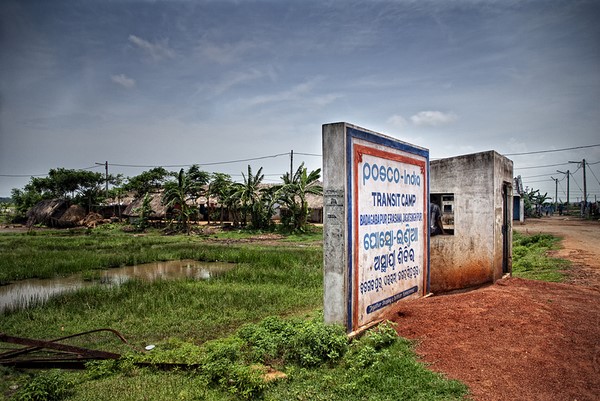 |
| The transit camp of POSCO, India that has been set-up for the few villagers who are so-called "Pro-POSCO". Image by Ayush Ranka . Copyright Demotix (22/7/2011) |
He was arrested on 3rd February 2013 by the police on false charges, taken to Kujang prison where he stayed for 26 days and released on bail on 01 March 2013.For its part, POSCO India has strongly denied having any role in the abuse of human rights:
Posco has always urged the government of Odisha to first safeguard the human rights and livelihood of innocent villagers and rejects/deplores any unlawful violence against them.More information can be found on the Stop POSCO campaign and Video Volunteers website.
First Published in Global Voices
Subscribe to:
Comments (Atom)




















